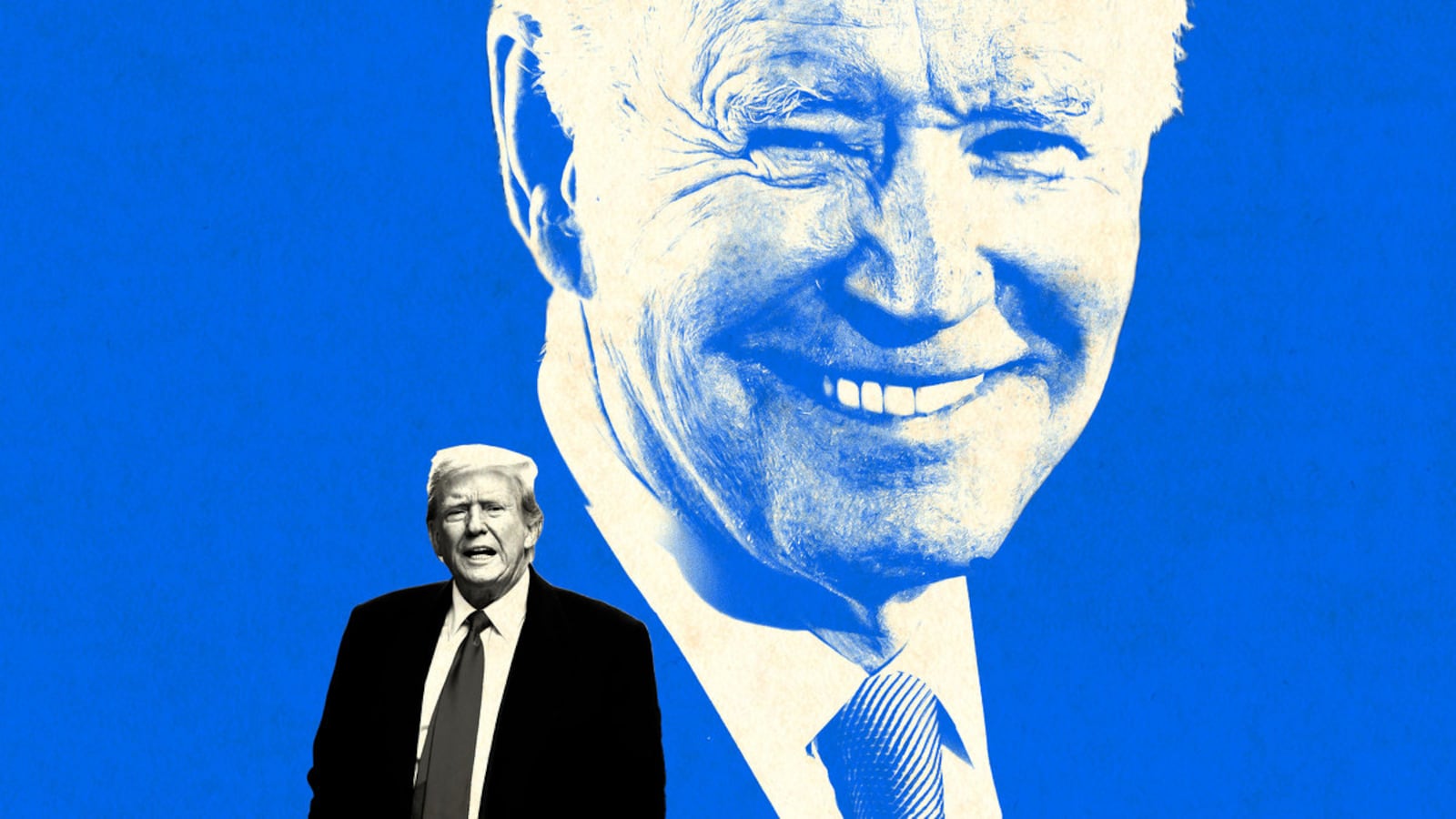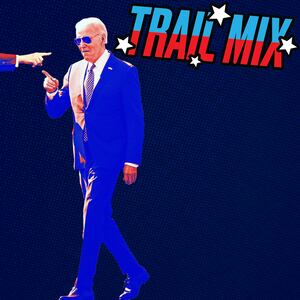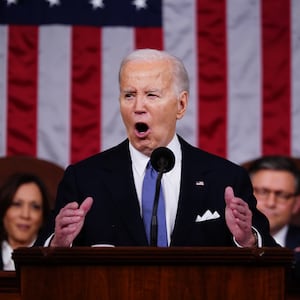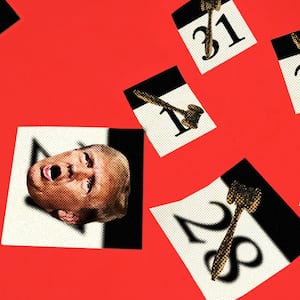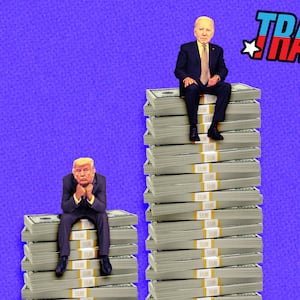Just a few months ago, it was hard to see the ingredients of a Joe Biden comeback—even while squinting at the recipe.
The president began the election year with his approval rating at historic lows. He was trailing Donald Trump in almost all of the key battleground states, as well as in national polling averages. Influential liberals were so concerned that the octogenarian incumbent did not have another campaign in him that some were openly calling for him to be replaced as the nominee.
As the general election kicks off this spring, however, those calls have quieted—because Biden’s resurgence is coming into focus. While the president still faces serious obstacles to a second term, several important data points are lining up to demonstrate he is picking up badly needed momentum.
For the first time in a long time, there’s good news for Biden on the polling front. Gradual improvements in the battleground states along with an uptick in his approval rating led one Democratic strategist, Simon Rosenberg, to declare “the Biden bump.”
The boost is at the very least correlated with Biden’s fiery State of the Union address on March 7, when he repeatedly went after his “predecessor” and made sure to mix it up with Republicans in the chamber on a few occasions.
Since then, Biden’s team has continued the punchy, combative tone on display that night, using press releases to cheekily slam their legally challenged opponent as “Broke Don.”
On top of that, the Biden campaign has continued to flex what has always been its core strength: fundraising.
With a $53 million haul in February, the Biden campaign built on their already impressive financial advantage over Trump, who brought in only $20 million over the same period. The Biden campaign has $71 million in cash on hand, compared to just $33.5 million for Trump.
The tide is turning, a Biden adviser argued to The Daily Beast, and although they aren’t putting too much stock into any recent polling upticks, the president’s team is ready to seize upon April and May as a crucial time to ambush a wounded Trump campaign.
“It’s aggressive,” a source within the Biden campaign said, requesting anonymity to speak candidly of the mood inside the re-election team. “There’s a lot of travel, there’s a lot of work. It’s all exciting. We’re heading into this final fundraiser of the month with the former presidents [Obama and Clinton], but it’s aggressive.”
Taking advantage of a substantial fundraising lead, the Biden campaign is focusing on two key areas: travel and organizing.
Since his State of the Union, Biden has visited every major battleground state—typically pairing official White House stops with separate private campaign events—in an effort to demonstrate his ability to keep an energetic schedule.
Trump, on the other hand, has only done a rally in Ohio and another in the battleground state of Georgia since Super Tuesday. Otherwise, he’s mostly been confined to his Mar-a-Lago estate as he prepares to spend the second half of April and most of May stuck in a Manhattan court four days a week for the upcoming Stormy Daniels hush money trial.
Second, the Biden campaign is going full steam ahead on hiring in the battleground states, approaching 100 field offices with more than 130 staffers spread across eight major battleground states: Pennsylvania, Michigan, Wisconsin, Georgia, Arizona, and Nevada, as well as North Carolina and New Hampshire.
Such investments mean that Biden can begin the crucial work of mobilizing voters early. The Trump campaign, by comparison, could not tell The Daily Beast whether they have made any additional hires or opened any field offices in the battleground states, beyond shifting over the same team focused on early primary and Super Tuesday states.
In an election which will likely be decided by less than tens of thousands of votes in a handful of battlegrounds, the Biden campaign is focusing on gaining as much as they can at the margins now to catch up to Trump.
Ramping up their field organizing, along with getting Biden on the road and in front of cameras to show he still has the energy to campaign at full throttle, is an opportunity they can’t afford to miss while Trump remains mired in legal and financial problems.
“I think the president is beginning to do the very important work that wins elections, which is travel the country, set the tone for what this election will be about, and build a coalition and build an operation that builds a winning coalition,” Kevin Munoz, Biden’s national campaign spokesperson, told The Daily Beast in a phone interview.
“At the same time that Donald Trump has very real infrastructure issues, has no interest in building a winning coalition and is actively attacking the voters that will decide this election, ultimately this will come down to those voters,” Munoz said.
Chris LaCivita—a top Trump campaign adviser who is also the chief operating officer of the Republican National Committee—rejected the idea that the former president’s team should disclose its organizing plans.
“By combining forces and operations, The Trump campaign and RNC are deploying operations that are fueled by passionate volunteers who care about saving America and firing Joe Biden. We do not feel obligated however to discuss the specifics of our strategy, timing and tactics with members of the News Media,” LaCivita told The Daily Beast.
“Democrats want to talk process because they don’t want to talk about Broken Braindead Biden and his absolute failure,” LaCivita argued. “The media should not do Democrats’ bidding and should focus on the issues the American people care about.”
Still, for a Trump operation obsessed with polls, the first cracks in the former president’s so-far dominant lead are beginning to appear.
Biden’s approval rating has seen an uptick in the FiveThirtyEight rolling average—jumping up from under 38 percent on March 12 to over 40 percent approval just two weeks later—and pulling ahead in The Economist’s head-to-head polling average for the first time since September.
To add to the Biden campaign’s morale boost—even though his team tends to reject the value of polls this far out from an election—Biden led Trump in three polls last week alone.
While there remain undecided voters in key states, the Biden campaign will worry more about them later, given the abundant data on how undecided voters are very often late deciding voters as well.
The Biden campaign is eyeing the late spring and early summer to start focusing their messaging on persuading undecided voters, according to the senior aide, with the present focus continuing to be building out their door knocking infrastructure to make sure core voters show up to cast their ballot no matter what.
“That’s what matters at this point in the cycle,” Munoz said. “And I think we have a very good story to tell, not only on the operation we’re building, but also on the issues that we’re fighting for. These are the issues that when Americans go to the ballot box, they care most about, and Donald Trump is running on an agenda that people actively root against when they go to the ballot box.”
The Trump campaign has their own version of such an argument—one they believe will make Biden’s campaign hires irrelevant.
“The Trump campaign will raise the money, deploy the necessary assets, and win because President Trump will secure the border, make American families more prosperous, and make our nation respected on the world stage,” Trump campaign spokesperson Danielle Alvarez said in a statement to The Daily Beast.
Veterans of the presidential campaign trail, however, think these seemingly small moves in isolation can make quite a big difference when put together over the long haul.
Jim Messina, who served as Barack Obama’s 2012 campaign manager, argued that Biden is in a stronger position to win than Trump given the cards they’ve been dealt.
“I like to play poker and I would simply much rather have Biden’s cards than Trump’s,” Messina said.
Biden’s two key advantages, according to Messina, are on the economy and the legal front.
“The economy is improving and people are feeling it, Biden has an affirmative message, and Trump will continue to remind independents why they voted against him in 2020 by campaigning from a courtroom,” he said.
Matt Grossman, a political scientist with Michigan State University, said it very well could be the case that March marks the nadir of Biden’s polling woes, but added a note of caution for the president’s campaign.
“My question has been what kind of message is likely to work this time,” Grossman said. “In 2020 we had strong evidence people had already made up their mind about Donald Trump, but not Joe Biden… Now we have two very well-known candidates, so it would make me expect the efficacy of any persuasion effort would be less.”
With two such well-known candidates and some 70 percent of the public weary of a 2020 rematch, the little things could count even more this time around.
“If it’s close to a 50-50 election, then minor things can still move the outcome. And certainly overall, there’s evidence that more contact is better, to deliver both turnout and persuasion messages more is better,” Grossman said.
“They’re just trying to get any small advantage they can.”

